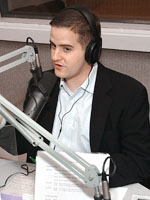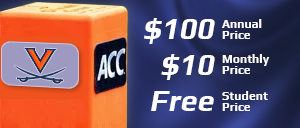 |
|
Jed Williams |
Wahoos, allow me to begin this column with a disclaimer: the following paragraphs are laced with buzz words that, over the last several weeks, have driven Cavalier nation into a disturbed frenzy. Just leveling with you. You’ll hear about “signs,” ask “what would Jefferson think?” and ponder whether or not to “fire Groh.”
Now, here’s the rub: sure they’re included, and that inclusion might spark electroshock reactions, but this piece isn’t so much about the aforementioned buzz words (or buzz-kills if you prefer) as it is about what they signify for you. This is about your voice – and the multiple mixed messages that the University of Virginia continues to send its loyal fans about the value, or lack-thereof, placed on that voice.
On the one hand, UVa exhorts its crowd to stand up, slop spirit paint all over the face and belly, get loud and proud, and embrace “the power of orange.” Then, in the same breath, and without pause, the same school tells the same people to sit down and shut up.
Confused? I know I am.
And that should never be the case. Being a fan should never feel like fumbling around with a Rubik’s Cube. We shouldn’t be asking “what can we do?” or “what would TJ do?”
No, the real question worth asking is “What should UVa do?” And the answer sounds a whole lot like what Larry Sabato might suggest to the McCain and Obama campaigns. Find a message and stay on it. Don’t stray. If you do, stop … immediately. Never, ever confuse your audience. And most of all, give them a voice. After all, it ain’t about you. It’s about them. It’s about us.
To understand how Virginia Athletics got to this identity crossroads requires a brief trip back in time. In January of 2001, President John Casteen, flanked by then-Athletics Director Terry Holland, beamed as he introduced new football coach Al Groh. Without hesitation, the 1967 alumnus got on message. That message: create a “sea of orange” … pack Scott Stadium with so much spirit that it oozes “big-time football house.”
Seven-plus years later, Groh’s results are mixed (and declining rapidly), but the fan returns have been overwhelmingly positive. Sure, there was some early bowtie-and-brie versus beer-and-brats friction. But the base showed up in droves, more so with each passing year. They showed up full of zeal for their team. And they paid more to do so, punctuated by the re-seating policy implemented by the Virginia Athletics Foundation this past winter, which required Wahoos to fork over more money than ever – and for longer periods of time – to retain the seats they’d long held.
Our thrust here isn’t re-seating, though. That’s a fact of life in the college sports arms race. But, if you’re going to challenge a fan base to produce unprecedented levels of enthusiasm and require similarly unprecedented bundles of cash from them to do so, then it might be a good idea to give them a voice … not take away their signs.
There’s not much more I can add to the “Cavs ban signs at all games” issue that hasn’t already been discussed to the point of nausea. Other than this: UVa’s motive couldn’t be more transparent, no matter what it swears publicly about intent “to support and promote sportsmanship in a positive game-day environment for all fans in attendance.” Translation: to all the David Beckers of the world, take your “Fire Groh” ball and play elsewhere, even if, as ESPN.com’s Rick Reilly astutely pointed out, “99% of sports signs are positive.” They’re entertaining, amusing, even jocular (sorry, couldn’t help myself) … not damning. And they give the fans an outlet for expression that should never be taken away, except in the most extreme cases. Instead of promoting a healthy, collegial environment by regulating the obscene and promoting everything else, the administration decided to do away with the right entirely.
Sure it’s legal (I looked it up in my dog-eared mass communication law book … don’t get me started on content neutrality, dedicated forums, yada yada yada). Yes, Virginia has the authority. But legality and authority don’t equate with prudence.
Which brings me to the Virginia Sports Radio Network, of which I was a proud member for several years. While the signs dispute has erupted like a volcano atop Monticello, another decision from on-high at dear ol’ UVa has again suppressed fans’ ability to candidly discuss their football program.
Beginning with the USC game on August 30 and running for the entire football season, the radio postgame show will no longer take live on-air phone calls. Okay, so it’s not that big a deal. After all, how many people would feel inspired to call in after a 52-7 home shellacking anyway? Are fans who are packing up the tailgate and heading for the interstate all that interested in the yapping of a half-delusional “Sammy from South Boston” or a fully-tanked “Bobby Joe from Big Stone Gap?” That’s what I thought.
Still, as righteous as this may sound, it’s the principle that matters. I hosted a daily talk show for many years, and while I never believed that people listened to hear “Scooter on a cell on I-64,” I’ll be darned if we didn’t make sure that the integrity and openness of that forum was protected at all costs. That forum – which I believe should be one of fans’ many inalienable rights – has been stripped away, replaced instead by “postgame text messages and e-mails.” I can’t help but wonder if one of those texts read: “omg … did u c … no signs at uva … :(.”
Naturally, this wandering journey leads us to this past week, when Virginia confused the dickens out of its supporters. Peter Lalich started at quarterback against Richmond on September 6. After the game, Groh defended his young signal caller in the face of reports that Lalich had violated his probation. Groh had his QB’s back again in media events Tuesday and Wednesday.
Then, later that Wednesday, Virginia abruptly declared that “Peter Lalich Won’t Play For The Cavaliers On Saturday.” Perhaps, as recently reported, new information about Lalich came to the fore that gave the football staff and the administration no choice. Or maybe, as kindled by some in this state, high-ranking voices piped up and wrested any decision-making power away from Groh. We may never know the full truth. All we know was what was delivered to us in the Wednesday afternoon release, a bulletin that included quotes from Groh, Lalich, and Athletics Director Craig Littlepage.
Here are some of the “highlights”:
Groh: “We stand by Peter and in talking with him have made a decision which is best in the short term for him, the team, and our University. We have a strong set of standards and values on our team that reflect those of the University and we do not compromise those values to win football games.”
Littlepage: “Peter and Coach Groh came to a decision and I fully support it. Over the past 24 hours I’ve had conversations with both Peter and Coach Groh. The focus of our discussions shifted from due process and fairness and moved toward what would be best for Peter and the team, at least until such time that matters were cleared up about his probation status.”
Did you get all that? What in the wide world of sports is going on here? Again, we may never find out the true story, and I don’t think we’re necessarily entitled to it, but shouldn’t we expect a more cogent explanation than that? Plus, if Groh is running the show, then why does Littlepage need to throw an ambiguous-as-heck quote in there? Would that happen at USC or Oklahoma or Florida?
And if Groh isn’t running his own show, then a bevy of questions arise, mainly “why isn’t he?” and “why is the school, funded by its fans, paying its head coach the 14th highest paid salary in college football to be played like a puppet?”
I’ll save any additional performance-versus-salary thoughts for later discussion. The fundamental issue is this: UVa fans are confused, having again been sent a jumbled message about the state of the football program that they’re backing emotionally and monetarily.
It’s soul searching time in Madison Hall and at the McCue Center. Time to lift the ban on signs. Time to let the phone lines ring. Time to give the fans their voice back. And time to get on point: elevating the football program to where it needs to be. Time to start winning games, not winning “PC points.” Time to stop mixing the messages.
That’s what TJ would do. Hey, sounds like a decent idea for a sign, doesn’t it?
This a sample of the types of articles available through the Sabre EDGE subscription service. Join life on the EDGE today!



